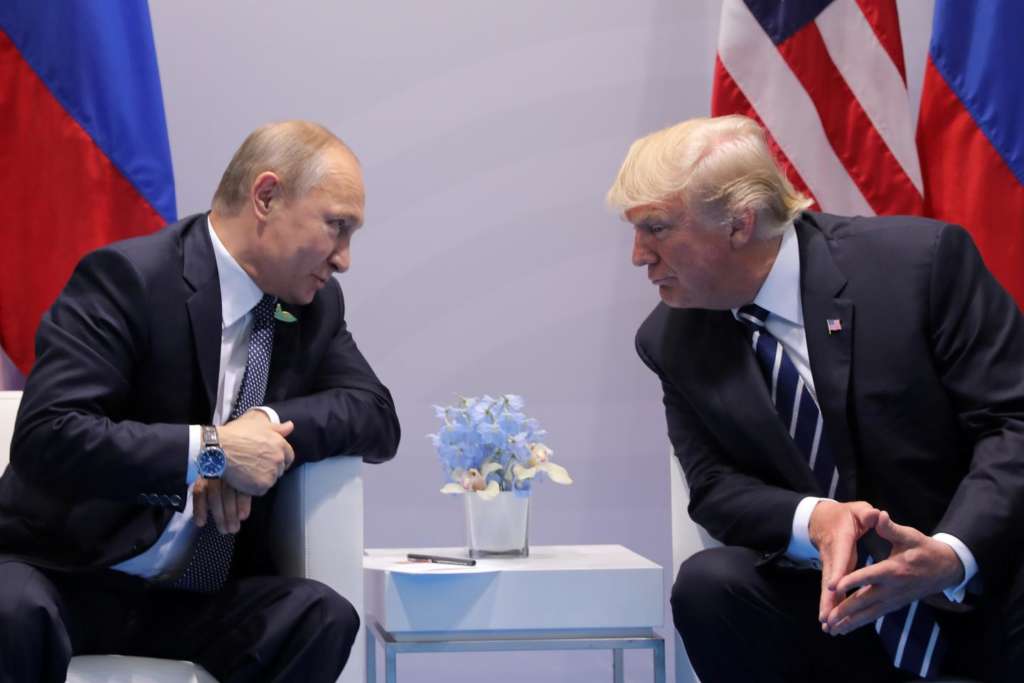In two recent interviews, President Donald Trump made the argument that Russian President Vladimir Putin would have preferred Hillary Clinton in the White House.
Trump’s argument is that he “campaigned on strong military, strong borders, and low oil prices” and these goals don’t benefit Putin:
Look what I’ve done – oil prices have been driven down. We’re sending LNG to Poland, massive shipments to Poland. That’s not what Putin wants. And for the military, we’ve got $56 billion more of equipment than anybody ever thought of, in the last budget. Putin doesn’t want that – so why would Putin want me?”
Under Clinton, Trump said, the US military would be “decimated” and oil prices would be higher:
We’re going to be exporting energy – he doesn’t want that. He would like Hillary where she wants to have windmills. He would much rather have that because energy prices would go up and Russia as you know relies very much on energy.
Putin doesn’t care whether the US standing army exceeds half a million or not, or whether the US Navy has more ships. Even during the Cold War, when the Soviet Union was a much bigger country than today’s Russia, it couldn’t outspend the US on defense. Today, the US military vastly outnumbers the Russian one, and once other North Atlantic Treaty Organization countries are added in, Russia is dwarfed, frankly. That, however, doesn’t matter because both countries’ vast nuclear arsenals deter them from ever having an all-out war, and for possible local and proxy clashes, numerical strength isn’t important.
Russia and the US back different sides in the Syrian war. There, Trump is doing roughly what Clinton intended to do to defeat ISIS. He intensified the US air campaign and stepped up support for rebels opposing Syrian President Bashar Al-Assad. He has also launched isolated attacks on Assad’s forces, ostensibly to restrain them from using chemical weapons or striking US allies, but perhaps also to make sure the US-backed forces don’t have to compete for areas they’re clearing of ISIS militants. President Barack Obama refrained from such aggressive actions, but Clinton, who established herself as a Syria hawk, likely would have acted along the same lines. Many feared she would have been more insistent on removing Assad — she has called it a “number one priority” — but if she did, that would hardly have made her Putin’s preferred candidate, since he continues to stand by Assad as an ally.
On energy, too, President Clinton would have been an equal or greater nuisance to Putin.
Democratic members of Congress currently support a bill broadening Russia sanctions to include energy pipeline projects, another indication that Clinton probably would have pushed through similar measures to retaliate for what she, in the summer of 2016, came to see as a major Russian effort to defeat her.
Whether or not Putin would have preferred Clinton as president hinges on more esoteric considerations than whether or not she would have followed traditional US military and energy policies, which have always clashed with Russian interests and to which the Kremlin has long adapted.
Clearly, given the role the Russian propaganda machine took on during the 2016 campaign, Putin was interested in short-term destabilization and in mocking US democracy. But he has given no indication that he wants instability in the US over the long term. It’s not clear how it can benefit the Kremlin except by diverting attention from its quieter exploits, such as the long-term, slow movement of the Russian border into Georgian territory occupied by Russia’s puppet state of South Ossetia.
If Putin is learning anything from the chain of events following Trump’s election, it’s probably a deepening conviction that he can’t get any traction with the US because its institutions are inherently hostile toward someone like him.
Bloomberg View
